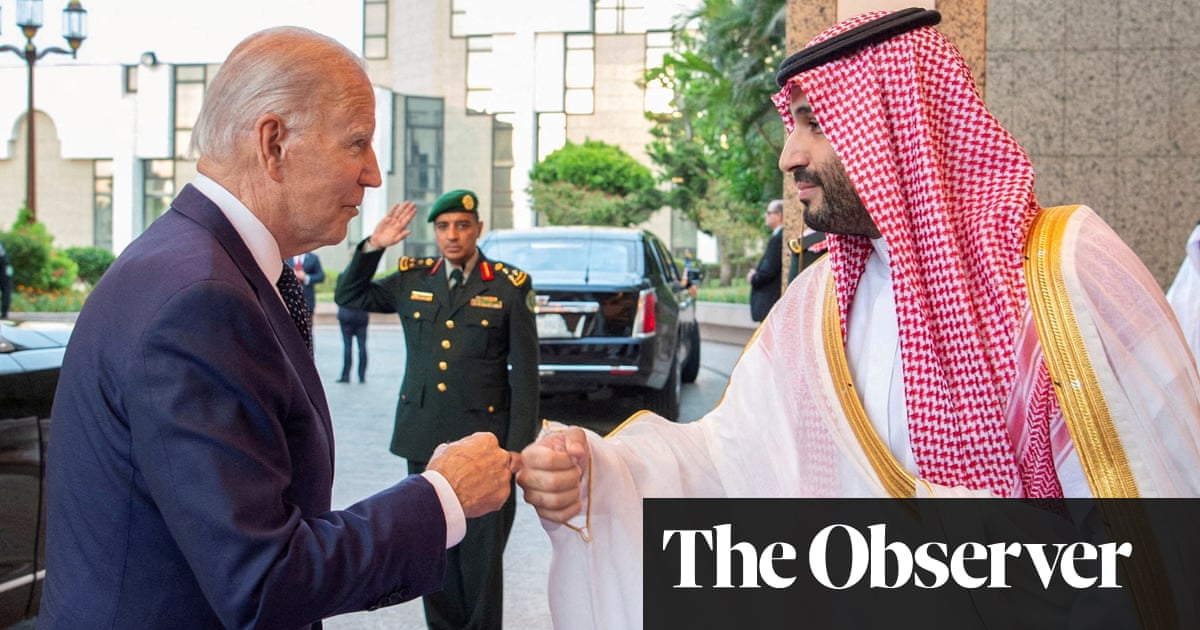
Friday night’s US airstrikes against Iran-backed militias in Syria and Iraq marked a new high tide in the violence spreading across the region since the start of the Gaza war.
The Biden administration, however, is now seeking to show it has more in its Middle East policy toolkit than precision-guided bombs. While it was planning the midnight sorties in retaliation for an attack last Sunday on a US base in Jordan, the White House has also been sending signals that it will not let the worsening crisis unfolding in the Middle East go to waste and that it is developing a plan to use the turmoil as an opportunity to transform the region.
The message has been sent out through leaks and briefings to sympathetic columnists before today’s departure of secretary of state Antony Blinken to the region, his fifth since the Israel-Hamas conflict began on 7 October, which will take him to Saudi Arabia, Egypt, Qatar, Israel and the West Bank.
Blinken’s first four forays achieved little, certainly not for the 2.3 million civilians in Gaza, though the US claimed some credit for the fact that the war did not immediately spread to Lebanon. This time, according to the lines being put out, the secretary of state is carrying something more substantial in his briefing papers: a “grand bargain” deal involving normalisation of relations between Saudi Arabia and Israel, and substantial movement towards the recognition of a Palestinian state – all incentivised by diplomatic and economic sweeteners from Washington.
At the same time as this new diplomatic push was being briefed in Washington, the UK’s foreign secretary, David Cameron, suggested that both the UK and the UN security council could recognise Palestine sooner rather than later, saying: “It can’t come at the start of the process, but it doesn’t have to be the very end of the process.”
It seemed very likely the former British prime minister’s remarks, delivered on a trip to Lebanon, had been coordinated with Washington to drive home the signal that “plans are in hand” to look for enduring solutions to the underlying Israeli-Palestinian conflict.
The US is also reported to be studying options for when its recognition of a Palestinian state would come during the course of an eventual peace process, not necessarily leaving it until the end.
Among the options, according to a report by the Axios news site, are the bilateral recognition of a Palestinian state, forgoing the US veto on the UN security council vote admitting Palestine as a full member state (it has had non-member observer status since a UN general assembly vote in 2012) and, third, encouraging other states to follow Washington’s lead in recognition.
At the same time Saudi Arabia, which has not renounced its interest in normalising relations with Israel throughout the four months of the Gaza war, would offer to establish diplomatic relations with Israel in return for a substantial and “irrevocable” step towards Palestinian statehood.
The thinking in the White House is apparently that such an offer from Riyadh would put Benjamin Netanyahu in a bind. His far-right coalition would never accept such a deal but would be robbed of US support if it did not.
To stay in office, and thereby to elude the threat of prison as a result of the criminal corruption charges he faces, Netanyahu would have to dump his coalition partners and go looking for others, according to the plan. His fall or the creation of a new governing coalition would create space for diplomatic progress towards the elusive two-state solution for Israel and an independent Palestine. That in turn would create a happy synergy for Joe Biden in domestic politics by leading Arab-Americans, particularly in the swing state of Michigan, to forgive him for his steadfast support of Israel in its Gaza campaign, thereby helping save his presidency.
Meanwhile, a Saudi-Israeli concordat that achieved Palestinian statehood would reshape the Middle East, primarily at the expense of Iran, which has sought to project itself as a Palestinian champion in a time of occupation and persecution. It underpins Tehran’s projection of influence across the region.
That, at least, is the plan. It is similar in most respects to the administration’s Middle East policy before 7 October but now with the added urgency caused by the humanitarian catastrophe in Gaza.
The long history of the Israel-Arab conflict does indeed suggest that real progress only comes after extreme violence. Egypt’s defeat in the 1973 Yom Kippur war led to the Camp David accords five years later.
The quick US victory in the Gulf war gave it the clout to bring Israel and its Arab foes to the table at the Madrid conference in 1991.
The first intifada uprising that began in 1987 ended with the initial Oslo accords in 1993 and the beginning of the process that was intended to establish two sovereign states living side by side. Conflict creates urgency in the search for alternatives, but urgency is not usually enough to produce results. The Madrid conference and the Oslo process, after showing great promise, ultimately failed in the face of the hard realities of the region.
Another key ingredient, argues Aaron David Miller, a former state department negotiator on the Middle East, is leadership. In Saudi Arabia, Miller said, there is a leader ready to take risks in order to win prestige: crown prince Mohammed bin Salman. “You have in Jerusalem a desperately risk-ready prime minister who, frankly, is fighting for his political life and most likely for his freedom,” said Miller, now a senior fellow at the Washington-based Carnegie Endowment for International Peace. “In order to have any chance of beating his indictment, he has to stay in power.”
Miller suggested a bigger question hangs over how much of a political gamble Biden may be prepared to take, such as an early recognition of Palestinian statehood.
“Presidents on this issue do not tend to be risk-ready during election years,” said Miller.
“The basic problem is that time is not an ally of this process. It’s an adversary, because standing in the way of any of this happening are too many moving parts and too many obstructionists,” Miller added. “The most consequential election in American history is going to occur nine months from now. It’s just too complex – and they’re going to run out of time.”
Among the problematic moving parts in such a deal are Saudi expectations from the US. Until now, Prince Mohammed has been insisting on a defence pact with Washington and technical support to build a Saudi nuclear power industry. Neither is likely to be approved by Congress.
“Trump owns the Republican congressional caucus now and he will say to them: ‘Of course you’re not going to give this to Biden,’” said Daniel Levy, president of the US/Middle East Project thinktank.
The success of the whole venture then would be dependent on the crown prince being content with the mere satisfaction of being godfather to a Palestinian state. It is unclear that would be enough to sway him.
The second shaky assumption is that Netanyahu would see a Saudi normalisation deal and the consequent continuation of US support, rather than the safety of his existing hardline coalition, as being essential to his survival.
“They [the Biden administration] think they can stitch this together and create circumstances where Netanyahu is in a bind and has to ditch his coalition allies, and I don’t see what they’re putting down as being enough to do that at all,” said Levy. “No one in Israel is going to say: ‘Oh my God, Bibi [Netanyahu] blew an opportunity for Saudi normalisation just because he wouldn’t agree to Palestinian state.’ Bibi will just turn around and say: ‘I’m the guy who got normalisation with other Gulf states without any concessions.’”
Even if Netanyahu did decide to dissolve his coalition and look to patch together another, the ensuing election campaign would take months, and it is far from clear that other political leaders would be ready to become coalition partners with a man they despise for a minute longer than the continuing military campaign requires, or that they – most of the moderate right and centre – would be much more enthusiastic about the creation of a strong Palestinian state.
Given that political reality – the absence of support across the Israeli political arena for a fully empowered Palestinian state – any formal recognition by western capitals or the UN security council would be largely symbolic, according to Rashid Khalidi, professor of modern Arab studies at Columbia University in New York.
“It is literally meaningless,” Khalidi said. “Sovereignty, settlements, occupation: if they deal with those things, then it’s meaningful. But will they remove a half a million Israelis? No. Will they end military occupation? No. This government, the next government, the government after that, will not end the Israeli occupation of the West Bank.”
On the Palestinian side, Hamas has long acted as the spoiler to any attempt at a two-state initiative, and the Gaza war has immeasurably strengthened the movement’s support in the West Bank.
Nor is it clear what a “revitalised” Palestinian Authority, proposed by US officials as the putative government of a new state, would look like. Its leadership, which has gone 18 years without a vote, would be unacceptable to most Palestinians. Up to now, elections have been blocked by Israel’s refusal to allow the people of East Jerusalem to take part.
Such are the height and sheer slipperiness of the mountains diplomats would have to climb to make the plan work, in so short a time given the electoral calendar, that many Middle East experts suspect it may be little more than White House talking points designed to address the collapse in Arab-American support for Biden since the Gaza war ignited.
“I think the driving force behind this, frankly, is not a careful appreciation of the political reality in Israel and in Palestine. It’s a desire to win the 2024 election by making it look like the president is doing something,” Khalidi said.
“There’s a complete blindness to the realities of the two countries we’re talking about, Israel and Palestine, which means that this is essentially a show for the peanut gallery, a show for the American electorate. I think the possibility of them coming up with something that will actually fly is nil.”












